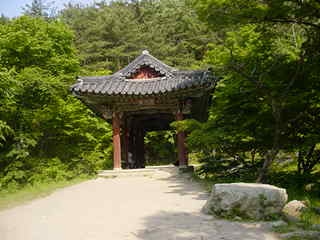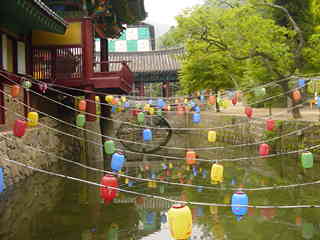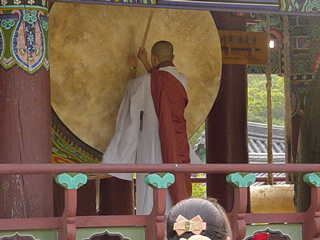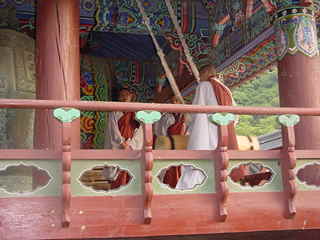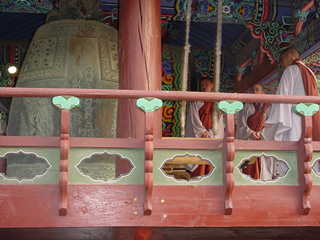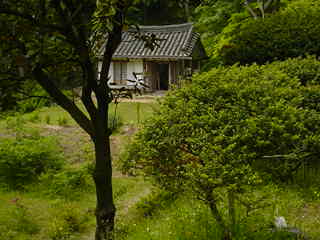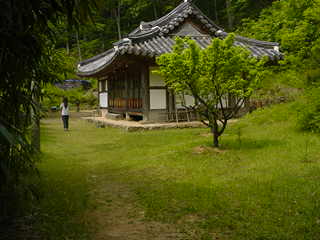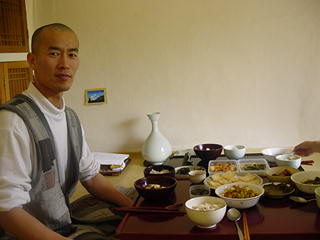
|
|
Jin-soon and I trained it to Sooncheon, in southwest Korea. From there we took an old bus (with matching driver) to Gongwangsa, one of the three principle monasteries in Korea. They offer people the chance to stay at the monastery and live with the life of a monk for anywhere from a day to a week. After almost five hours of traveling, we finally arrived at the temple. Jin-soon took me on a careful tour of the temple grounds, the many buildings, pagodas, and artifacts. This is Jin-soon's favorite temple in the world. I was honored when it dawned on me that that she was showing me around her most sacred place.
After our self-guided tour, Jin-soon asked a large and friendly monk if we could stay the night and join the evening and morning ceremonies. He agreed without hesitation and assigned us our rooms. I shared a small, furnatureless room with four other temple visitors, all Korean. It had been a long journey to get to the temple and by now we were quite hungry. The only food we brought with us was an orange and some Green World sprouted wheat crackers. We looked at the activity schedule posted outside of our rooms only to discover that we were too late for dinner. Just as our moans of disappointment tapered, to our surprise the dinner bell rang. For some reason the schedule was changed for this particular time of year. We shuffled happily into the temple dining hall and each grabbed a simple, white bowl, chopsticks and a spoon. We filled our bowls with aromatic rice porridge, a sour and orange-colored kimchi, marinated mushrooms and assorted stringy vegetables seasoned in sesame oil. Having filled our bowls, we sat in folding chairs at a long table with the other temple visitors. Although I had become very accustomed to Korean food, there was little to chose from in the Buddhist buffet and I was nervous--if it was disgusting I may starve for the next 24 hours. I cautiously tasted a small spoonful of rice porridge. It was exquisite. And with that I dove into my meal eagerly. Maybe it was because I was tired, maybe it was because I hadn't eaten all day, but I soon discovered that this was one of those meals where every bite was thoroughly and completely satisfying. I couldn't help eating slowly and deliberately. I twirled my chopsticks in the air as I chewed, unconsciously conducting the sonata of simple culinary perfection in my mouth. We ate in silence, though inside I was moaning with throes of primal pleasure. I took my last bite and looked at Jin-soon who had been patiently waiting for me to finish my sonata. I felt a little sheepish but the content look on her face comforted me. We picked up our bowls and walked down steep concrete stairs to the kitchen to wash our dishes. Downstairs, were young monks in tight rubber aprons wrapped around their, grey robes. They were contently and energetically sloshing dirty dinner dishes into suds and water. We washed our own dishes and utensils, bowed to the monks and mounted the stairs again. As we stepped out of the kitchen, I looked to Jin-soon and confessed, " O.K. That meal alone was worth the train and bus ride." The meal was free along with the the stay at the temple. However, they do appreciate an unspecified donation. We were enjoying the evening sun as we walked in the court yard and talked about Zen poetry. Jin-soon showed me a mural painted on the outside of a building. It was a colorful picture of men stirring gaunt, weak "sinners" in a giant cauldron. Jin-soon told me, to my surprise, that like Christians, Buddhists believe in hell, too. It is the penitence necessary before you come back reincarnated. As we were talking about the mural, we couldn't avoid noticing a monk who was walking in our direction. Even from a distance, it was easy to see that he was not Korean. We approached him and his thin, pale face met us with a large, toothy smile. We bowed and he began easy conversation with Jin-soon in flawless Korean. Noticing my silent, stupid smile, he switched languages and spoke in English with a smooth British accent. He could only speak with us for a moment but asked us if we would like to meet for tea after the evening ceremony. Delighted, we agreed to meet in front of the visitor's lodging building. The sun had just ducked behind the mountain trees and painted the thin clouds a golden peach. Soon, monks emerged from all corners of the monastery and formed long lines as they quietly walked to the Great Hall. Meanwhile, a small corps of monks, perched in an large open tower, evoked the end of day by beating on the one end an enormous Dragon drum. As they pounded complex rhythms on the drum, their lose grey robes furled like a flag as their arms blurred around the gigantic drum.
The monks finished their final cadence on the drum, and switched to ringing the bell, a 10 foot tall, 15 ton, ornate bronze cup turned upside down and held by the mouth of a dragon. One monk pulled a large log suspended on both ends by two thick chains and swung it a few times to the side of the bell to gain momentum. Then with all his strength, he swung back the log and threw it against the bell, blasting out a loud, long gong that sang for a full ten seconds before it began a slow diminuendo and rested as a low hum. After thirty seconds or so, the monk wielding the log had built up enough momentum for another strike and with the bell still humming, he rang it again sending another blast echoing off the temple buildings and into the surrounding mountain air.
Jin-soon and I followed the last monks into the Great Hall, were each issued a long, well-used prayer mat, and laid them in the only open space on the rough, wooden floor. We bowed three times toward the Buddha and remained kneeling in silence, our hands in prayer. A singular monk began to chant a low and lonely melody. Outside, I heard a humble stream that bubbled and churned, adding a playful descant on top of the monks textured riff. Then, as my mind was fully absorbed by the delicate counterpoint between the stream and the monk, to my surprise, 150 monks suddenly and simultaneously burst into a loud and deep refrain. Without thinking, I found myself singing along. My voice was drowned in the sea of monks and I could barely hear my own sound, but I could feel my chest and throat vibrate. It felt like strumming an acoustic guitar against my chest and feeling it resonate. I couldn't follow the words to the chant so I sang my own words. My own prayer: "Father, thank you. . . thank you for my family and friends who bless my life immeasurably . . .thank you for making my life holy." Outside, thirty meters away, the bell tolled again and I could feel the hum vibrate through the wood floor (suspended from the ground by poles). It vibrated my legs the way my chest and throat were vibrating. Om. As the monks sang, I closed my eyes and heard fifths, minor thirds, sevenths, bended notes, half tones, natural harmonics. It was hearing the ancient asian pentatonic, modal scale, music before it was influenced by the west. As I listened to the monks, I heard black slaves in work fields. I heard the blues. I heard soul. Later, Jin-soon told me that the chanting temple is called Han, meaning melancholy or blue. Following the evening service, we met with the English monk, Hey-am (meaning ocean eye--they get a new name when they become monks), who invited us to a small room, his master's personal chamber, where we sat on the floor and drank tea from a delicate korean tea set. Hey-am was serious and spoke with Jin-soon most of the hour and a half we spent with him. He spoke most of the time and he spoke most of the time in Korean. He talked about touching the soul through meditation. The clock struck the ripe hour of nine o' clock and we were off to bed. Before both feet had even touched the floor, I could feel, true to form, that this Korean room was much, much too hot for peaceful sleeping. My mind raced as I worried about spontaneous combustion. My spontaneous combustion. The other four men sharing the room had kindly lain out a spot for me. I took my place and the lights went off. The snoring began two minutes later. The old man on my right was a beach cave-- deafening echoes of the deluge rushing in and out with every breath. It had only been 10 minutes and the heat had already covered me in a thin layer of hot sweat. I turned onto my other side only to encounter a classical hisser and sucker, not a lot of nasal reverberations like Cave, just really loud air passing between his teeth with every inhale and exhale. I thought, "If only I had some balloons, an air mattress, or maybe a trumpet, I could have put him to some use." Needless to say, I didn't sleep that night. I rested though, and all night I thought of snoring metaphors. So at 3:00 am (yes, 3:00 [I pause for effect] AM) when the monks came around clicking their wooden fish bells, rousing us for the morning ceremony, I was more than eager to leave the sweaty, hissing, beach cave. I didn't realize that I'd actually have the chance to experience Buddhist hell. "Wow, they really give you the full experience, here." I grabbed my sweatshirt, put in my contacts and left. I breathed in the cool night air. The same monks were again perched in the tower taking turns waking up the earth, people, fishes, and birds by drumming on various drums and bells. We followed the monks inside the Great Hall and began a ceremony very similar to the one we experienced the night before. But this time, it was dark outside. I looked through the door and in the distance, I could see the, black silhouette of a monk in a separate temple as perfect as if someone had drawn his outline in the window. In Zen Buddhism there are 108 different forms of suffering. Therefore, to pray for those who suffer, one offers to Buddha the submission of 108 bows. This is accomplished by kneeling to the ground from a standing position, crossing the left foot over the right, butt close to the ankles, hands close to the face, palms down, and lowering the forehead to the mat at which point one turns the hand palms up, lifting them a few inches off the ground, returning the palms face down on the mat, then with the hands together in prayer, standing up to a full standing position . . . 108 times. In a row. Without stopping. I wonder if intense quadriceps pain is listed uniquely among the 108 as one of the forms of suffering. Truth be told, I lost count after about two bows and actually just felt the pain and submitted to a spirit of sacrifice and offering. I felt very moved. More bows, 500, 1000 and sometimes even as much as 3000 bows, might accompany some ceremonies. Having bowed, chanted, and sung, I was feeling quite lucid. Everyone filed out of the Great Hall except Jin-soon and I who took our mats to the center of the hall and began to meditate in the morning silence. The monks closed the doors and turned off all but one or two small lights illuminating the giant Buddhas in the center of the shrine. I closed my eyes and began to search inside myself, to meditate. I wanted to experience, to some small degree, the seemingly illusive Zen that Hey-am had talked about. I went deeper and deeper into my core, into my ha dan jun, into that white space, that part of me that never ages, but still feels pain, sometimes. I peeled away layers of emotion and intellect and tried to feel what ever it is inside. My sprit. I released my worries, my ego, my sarcasm, my habits, my weak intellect, my opinions and just was. I was just present of the second I was resting in and aware of what I was doing. Each second was an hour. I noticed how my body felt. I concentrated on the peace inside me. It felt good. I became more focused. Honed. I was experiencing the meditation that I have been cultivating during almost six months of kouksondo practice, meditation which was coming to a small fruition at that moment. And I went deeper. I prayed. Eventually we got up and stacked our mats neatly stacked beside the door and left. We walked to the kitchen and asked the monks if we could help prepare food for breakfast. Happy for our service, the monks immediately put us to work separating a large plastic vat of mushrooms, ginger, and sea vegetables. Then with large kitchen scissors, we removed the stems from rubbery mushrooms. As I sat snipping the stems off mushrooms, I listened to the kitchen monks chant as they sweated and stirred black cauldrons of boiling rice. I got that lucky feeling I do when I'm experiencing a once-in-a-lifetime moment. We finished our kitchen help and still had an hour before the 7:00 am breakfast bell rang, so we headed up into the mountains to do some kouksondo. The pre-sun morning sky was grey like the monks robes. They say that the grey represents all of the colors mixed into one. Breakfast--I recognized some of my mushrooms. It was a beautiful sequel to dinner the night before. After breakfast, we met Hey-am again for more tea. This time, he was speaking to me. As he poured me another cup of tea, he looked at me with a cheeky smile and said, "Korean Buddhism is funky as hell. " He told me stories about a few monks who drink, have sex, and watch korean soap operas, but who are still as enlightened as any other monk. "There's no one watching over your shoulder. It's personal." It was good to talk to a human this time, and not just the robes of a monk. I asked, "Don't you ever get the urge to put on a Stones record?" Another smile. "Sure. And I do." Hey-am suggested we hike the half mile to visit Tog-hyon, the monk at the hermitage temple. The sun was well up by now and we hiked through the bamboo forrest. We got lost but eventually found our way to the mountain dwelling. I was walking through peaceful folk dwelling in the movie Dreams by Akira Kurosawa. I saw that the monk was completely self-contained there. His plot had a well, an outdoor toilet, a private temple in a small wooden building the same size as his two-room house. Everything was obviously built by the monks themselves. Jin-soon and I sat and talked and enjoyed the morning sun.
Jin-soon and I had been talking casually for a half an hour when we saw the monk, Tog-hyon, emerge from the forrest carrying a walking stick and wearing a Buddhist-chic, patchwork vest, baggy, gray monks pants that tightened around the ankles with knots for buttons, and a large straw hat. He greeted us with a large smile and bow and before even bothering to learning our names, he invited us for tea and lunch. He spoke to me in rusty yet precise English. During tea he said that he'd learned English in law school before he became a monk, fifteen years ago. We sat down on the floor as he prepared the tea. Eager to begin conversation, I mentioned that it was very peaceful there at his hermitage, and without my knowing it, my lessons had began. "Why do you say that it is peaceful here?," he inquired with that sage smile of his. "I fumbled for something to say, sensing I had made a fauxpas and that for some reason my logic was about to be mercilessly squashed. "The peace we have have can only come from within. Otherwise, it will always leave us.," he asserted. "We are doomed for sadness if we base our happiness on things that are constantly changing." He stared deeply into my eyes. "True," I thought. Lunch was served. It was sticky rice mixed with the occasional yellow millet grain. It was two kinds of kimchi. It was assorted stringy vegetables. It was fried tofu squares. It was marinated mushrooms. It was a bowl of assorted assorted vegetables cooked with tofu. It was better than dinner the night before. Again I found myself chewing slowly and twirl my chopsticks in ultimate gastronomical ecstasy. Tog-hyon asked me, "Do you like korean food?" "Um. Yeah."
Almost jokingly, I asked if he liked American food. "I love Duncan Donuts," he said as he produced a small box of powdered, jelly-filled donuts. He gave us each a donut. I may eat another Duncan Donut in my life, but never one served on the proverbial silver platter of an enlightened Zen monk, in a hermitage. After lunch Jin-soon offered to do the dishes and I just before I jumped in to help, Tog-hyun looked me straight in the eyes and asked me if I would go on a walk with him. I felt bad that Jin-soon was going to miss this because of her offer to wash dishes. I wished Celeste was there with me to be experiencing this whole impossibly perfect experience. But it was just he and I. He met a thin yet worn path that begun near his house. He quietly walked along the path through the bamboo forest as I followed on his heals. I instinctually began to do the museum walk, hands clasped behind my back. I do this when I don't want to disturb the beauty and priceless art around me. We walked for a few minutes until we came to a bamboo barrier laying across the path which was obviously made by him. There was a sign on the post in neat Korean. He pointed to it and said, "This says that this place is not for just anyone. But you're not just anyone," and lifted up the barrier for me to pass. A few more minutes and we came to small building, which looked like an organized sculpture of the trees and orange clay of its immediate environs. There were tree posts supporting it, a curved, tiled roof, and a large wooden deck. "I built this with three other monks. I had a very difficult time," he said laughing. "Let's meditate." He offered me the only mat on the porch and we both sat down, crossed legged, and stared out into a vast, unspoiled mountain vista. West. Again, my meditation was deep and peaceful. My eyes were open. "What is this spirit inside me?" I thought. "That seems to be the 2 million question, here." Again, I became very peaceful. I stared a tree in the distance. It was different that those surrounding it. It was a lone, dark-green tree in an ocean of lightly colored spring-green trees. I felt like that tree was me. After 20 minutes, Tog-hyun said, "Do you hear the wind blowing through the pines? There's an old Zen poem that says, 'What is the price of the wind blowing through the pines?'." "So I ask you . . " (damn! here comes another question!) ". . .what is the price of the wind through the pines." I rattled off some light-weight answer like, "The wind, the trees, they are part of us all--part of our soul. Our soul is priceless-- "You don't understand me, do you?" "I don't understand," I said. "You studied English in the university, and you don't understand?" kindly goading me. "Stop thinking about it. You can't use theories to answer the question. You can't use language. You must doubt. You must continually ask 'the question', (who am I) and one day you will learn. It will take three days of constant meditation. Even while you are resting, your mind must be pondering the question of the price of the wind through the trees. Someday you will know. Let the blade of doubt cut through the blackness of the mind. Let's go back." And with that, we stood up and he led us back to his house. He entered his house and this time he opened the wooden shutters to the only window in the room. It opened to the West and made me sit directly to his left, facing the window. "He's so young and makes many mistakes, but his is very spiritually minded. I can see that," he said to Jin-soon and some other people who had come in our absence. Just before entering the temple the day before, I had purchased a hand-carved bracelet which was comprised of a circle of small skulls. Tog-hyun noticed it on my wrist and pointed at it asking, "What do you think that means?" Prior to buying the bracelet, Jin-soon and I discussed how the bracelet represented impermanence, how we are all a circle of beings, interwoven together, but are all impermanent here on earth. Though I feared that Tog-hyun would again use my logic as a latrine, I nonetheless had nothing else to say. All attention was on me. I paused for a second then repeated to him exactly what Jin-soon and I discusses. "Really? Very good!," he exclaimed. (Phew). More tea. It was time to go; we'd spent almost five hours with Tog-hyun. Before going, I told him that I'd be going home to family and friends in America and asked him if there was a message of wisdom that he would like to send with me. He told me that a message from him isn't necessary. Instead, I must find the message within my own self and share it. I should have learned that lesson by now. My new teacher again pointed at my bracelet and asked again, "What is that?" Considering my sketchy track record to his questions, I remained silent. I think that was the correct answer. Tog-hyun didn't probe further. He seemed content. Before leaving, Tog-hyun reached into a closet and gave me a very expensive box of tea. As he walked us to the edge of the hermitage he read the chinese inscription on the box. "It says, 'Zen and the taste of tea is the same." Then without a segue said, "Continue to doubt. Always doubt." And with that we bowed humbly to him, and left. It was late. We hiked back to the temple grounds and stopped by the Great Hall one more time to make our final bows. grabbed our bags and took the first bus out. We began our 4 hour trip home and I thought about Tog-hyun's words. Initiation into Zen--Scottro [2003-06-22]
Navigation newest letter | older letters
Last five letters Gathering [2009-09-04] ?2002, Scott & Celeste. |
